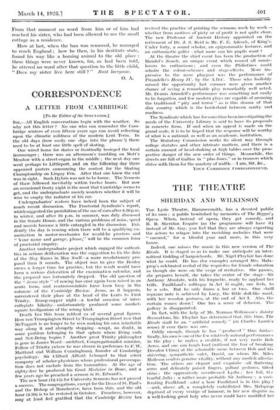CORRESPONDENCE
A LETTER FROM CAMBRIDGE
[To the Editor of the SPECTATOR.] SIR,—All English conversations begin with the weather. So why not this letter ? No one who can remember the Cam- bridge winters of even fifteen years ago can avoid reflecting upon the climatic mildness of the modern Lent Term. In the old days (how easily one slips into the phrase !) there used to be at least one little spell of skating.
One wired .home for skates or frantically besieged the local ironmonger ; there was an afternoon's tumbling on Mott's Meadow with a street-organ in the middle ; the next day one went perhaps to Littleport, and on the following day there appeared posters announcing the contest for the Skating Championship on Lingay Fen. After that one knew the end was in sight. Such Hybris was not to be borne. The Nemesis of thaw followed inevitably within twelve hours. But now an occasional frosty night is the most that Cambridge seems to get, and the undergraduate merely wonders whether it will be wise to empty the radiator of his car.
Undergraduates' motors have indeed been the subject of much recent discussion. The Proctorial Syndicate's report, which suggested the prohibition of the use of cars after 8.30 p.m. in winter, and after 10 p.m. in summer, was duly discussed in the Senate House, and the various problems of noise, speed and morals became a little entangled in the discussion. Evi- dently the day is coming when there will be a qualifying ex- amination in motor-mechanics for would-be proctors and " Your name and garage, please," will be the common form of proctorial enquiry.
Another undergraduate project which engaged the authori- ties in serious deliberation was the suggestion to fix the date of the May Races in May itself—a more revolutionary pro- posal than it :sounds. The object was to give the Henley crews a longer time for practice, but the result would have been a serious dislocation of the examinatien calendar, and the proposal was fortunately dropped. The old question of the Jesus style " of rowing has once again been raised in an acute form, and controversialists have been busy in the columns of the Cambridge Review. Jesus, as it happens, surrendered their place at the head of the Lents to First Trinity. Bump-supper night—a lawful occasion of inter- collegiate hilarity—unfortunately produced some market- square hooliganism of the wrong kind.
Death has this term robbed us of several great figures. How can Trumpington Street be Trumpington Street now that McTaggart is no longer to be seen making his own inimitable way along it and abruptly stopping—nrapt, no doubt, in some problem belonging to that sphere where Being ends and Not-Being begins ? Another great Trinity philosopher is gone in James Ward—architect, Congregationalist minister, Fellow of Trinity (where he was chosen in preference to F. W. Maitland and William Cunningham), founder of. Cambridge psychology. Sir Clifford Alibutt belonged to that select company of scholar-physicians whom professional preoccupa- tion does not exclude from the humanities. At the age of eighty-five he produced his Greek Medicine in Rome, and a few years ago he preached a sermon in St. Edward's. The new hour (12.15) for University Sermons has not proved a success. The congregations, except for the Dean of St. Paul's and the Bishop of Manchester, have been thin,. and the old hour (2.30) is to be restored in October. Preachers, however, may at least feel gratified that the Cambridge Review has
revived the practice of printing the sermons week by week— whether from motives of piety or of profit is not quite clear. The new Professor of Ancient History appointed on the retirement of Dr. J. S. Reid is Mr. F. E. Adcock, of King's. Under forty, a sound scholar, an epigrammatic lecturer, and an enthusiastic golfer—what more can his pupils want ?
At the theatre the chief event has been the production of Handel's Semele, an unique event which roused all music- lovers to enthusiasm ; and even the Philistines could admire the colour-schemes and stage-effects. More im- pressive to the mere playgoer was the performance of Pirandello's Henry IV. by the A.D.C. Those who foolishly missed the opportunity last summer were given another chance of seeing a remarkable play remarkably well acted. Mr. Dennis Arm/doll's performance was something not easily to be forgotten, and few modern plays are capable of arousing the traditional " pity and terror " as is this drama of that dim country which is the borderland between sanity and madness.
The Syndicate which has for some time been investigating the needs of the University Library is said to have its proposals in concrete form. If and when an appeal is made on the grand scale, it is to be hoped that the response will be worthy of what is a national, as well as an academic, institution.
The Statutory Commission works its silent way through college statutes and other intricate matters, and there is a certain amount of head-shaking at high tables over the pros- pective danger of the new order of things. Meanwhile, the streets are full of Gallios in " plus fours." or in trousers which strive with them for the mastery of width.--I am, Sir, &C.,
YOUR CAMBRIDGE CORRESPONDENT.














































 Previous page
Previous page